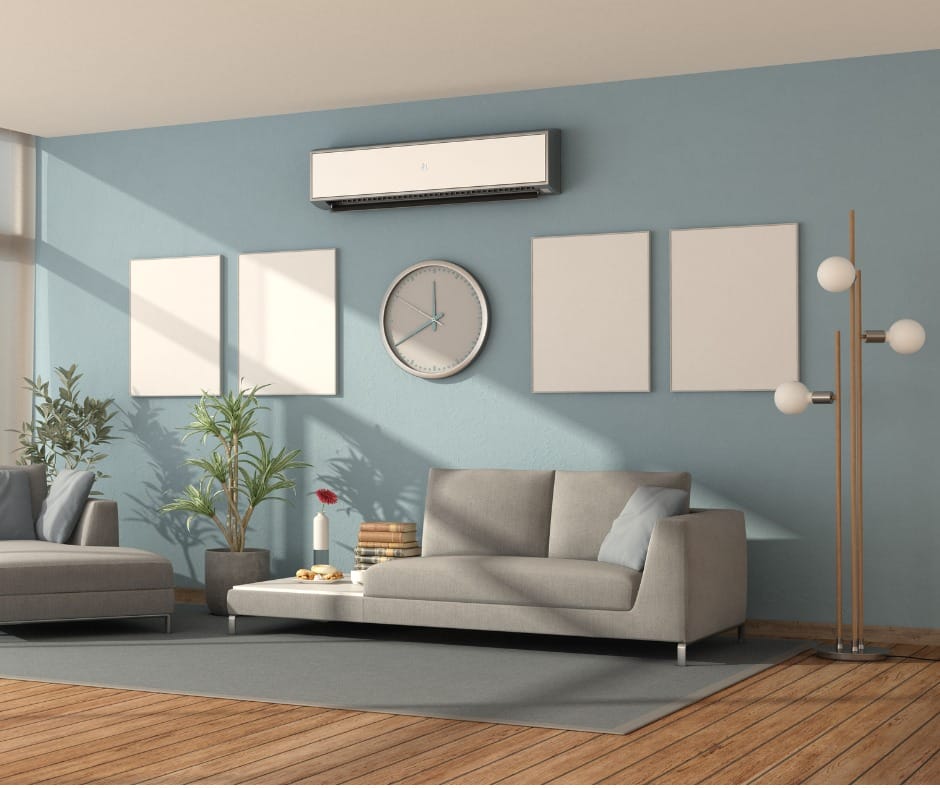
Shopping for a new heating and cooling system (HVAC system) can be complicated. Here, we’ll empower you to decide wisely by discussing the four most important considerations. We’ll also explain some heating and air conditioning jargon you’ll encounter.
Video: Buying an HVAC System – What to Remember
Here’s a brief video summarizing the four factors discussed in this HVAC buying guide.
Heat Pump Size
Correctly sizing your unit’s capacity to the square footage of the area to be cooled and heated ensures peak performance and maximizes energy savings. A heat pump that’s too small will work hard to heat or cool the space, reducing its effectiveness and efficiency. The additional strain could necessitate frequent repairs and an early replacement. But bigger is not always better! A unit with excess capacity won’t cycle often enough to dehumidify the space. When it does run, it will waste energy.
BTUs (British Thermal Units) are the measurement industry experts use when discussing and calculating heating and cooling capacity. Several factors determine a home’s BTU requirements, including interior dimensions, number of residents, and geographic region.
You can estimate the ideal size for your new heat pump using an online BTU calculator. You’ll need the width, length, and ceiling height of your home, along with information about its insulation.
Still, the quickest and most accurate way to determine the necessary capacity is to call your local HVAC specialist. If your home is in or near Charlottesville, VA, Fitch Services will come to your home, calculate the most efficient size, and provide you with a fixed quote, all at no charge.
HVAC Cost
When comparing the cost of different heating and cooling units, the price tag and installation fee don’t tell the whole story. Also, consider the lifetime cost and potential savings. For example, energy savings realized over the life of a high-efficiency heat pump can dwarf what you might initially save on a less efficient unit.
Upgrades, such as new ductwork, can yield energy savings that more than offset the additional upfront expense. Indeed, poorly constructed or damaged ductwork can result in significant heating and cooling loss.
A programmable thermostat is an affordable upgrade that provides significant benefits. Schedule your thermostat to meet your home’s changing energy needs throughout the day. For example, in the summer, program cooler temps at night for sleeping and higher temps during the day when no one is home. A programmable thermostat can lower your energy bills with no sacrifice to your comfort.
To reap the benefits of a high-efficiency heat pump, don’t overlook the upgrades your heating contractor recommends.
Understanding Efficiency Ratings
Nothing replaces the expertise of an HVAC professional when it comes to selecting a unit for its energy efficiency ratings. However, it’s still helpful to have a general understanding of these terms when you’re buying a new HVAC system.
SEER
When comparing or discussing heating and cooling units with your HVAC installer, they will often mention SEER, which stands for seasonal energy efficiency ratio. The higher a unit’s SEER, the more efficient it is. Heat pumps may range from a SEER rating of 14 (the minimum U.S. requirement, increasing to 15 in 2023) to the mid-20s for the highest-rated systems. A SEER rating of 14 or above is considered high efficiency.
AFUE
Annual fuel utilization efficiency (AFUE) applies to heating system efficiency for fuel-based and electric furnaces. The AFUE rating equates to the energy consumed that the unit converts to heat. The minimum AFUE standard is 78 percent, with high-efficiency units averaging 90-97 percent. For example, a unit with a 95 AFUE converts 95 percent of the fuel to heat. The higher the AFUE rating, the more fuel-efficient the unit and the lower the utility costs.
HSPF
The “heating seasonal performance factor” (HSPF) measures a heat pump’s heating process. While the minimum requirement is 7.7 for newer units, a high-efficiency system with a rating of 8.2 or greater will offer more efficiency and greater energy savings.
Energy Star Certification
The Energy Star logo designates a high-efficiency appliance that meets the rigorous standards of the Department of Energy and the Environmental Protection Agency.
Comparing Warranties
After narrowing down the possibilities, talk to your HVAC professional about what warranty options come with the units you are considering. Also, ask what extended or enhanced warranty options may be available. Explore all of your options now, as you may not be able to purchase a warranty later.
Consider the following when comparing HVAC warranties:
Term of the warranty: A warranty may include varying time frames of coverage for specific parts.
Exceptions: This would include things a consumer may do or fail to do that void the warranty.
Installation: Does the warranty include installation error or only parts?
There may be some HVAC protection endorsements you can add to your homeowner’s insurance, so check with your insurance agent to learn about your eligibility.
We’re Here to Help
Charlottesville area residents can call Fitch Services at 434-296-9980 or use our contact form to schedule an appointment with one of our licensed, bonded, and insured technicians. We can answer all your questions about buying a new HVAC system and help you select the perfect unit for your home. We also offer maintenance plans to keep your unit in tip-top shape for years.
Photo by iStock/archideaphoto




